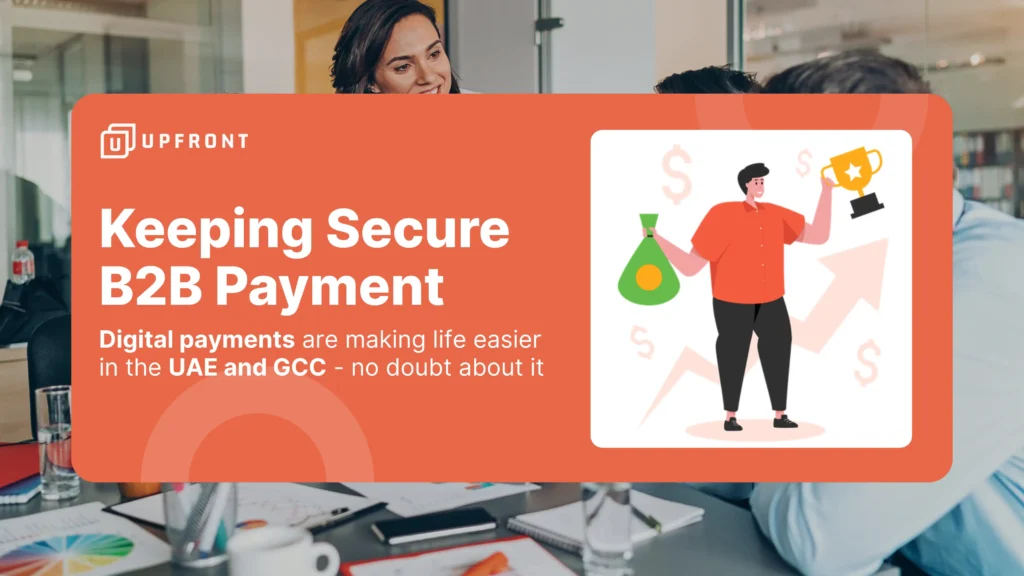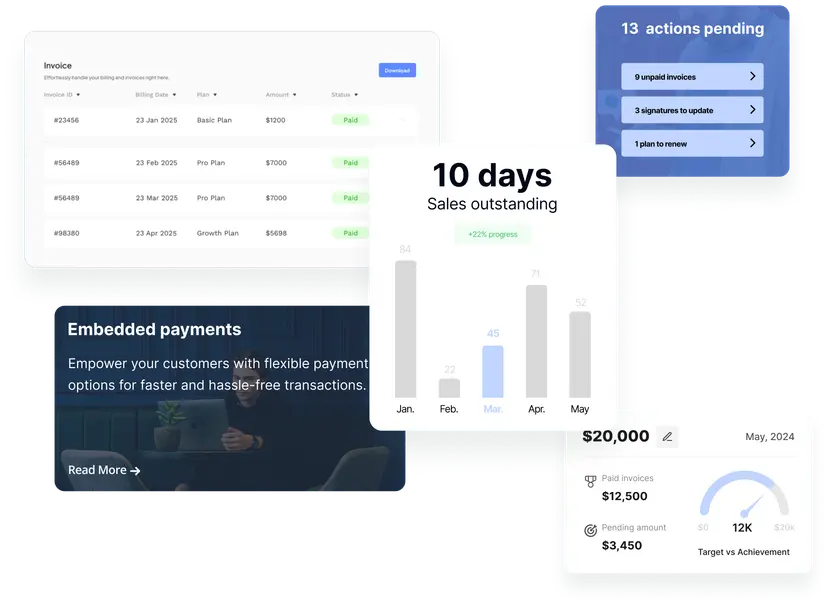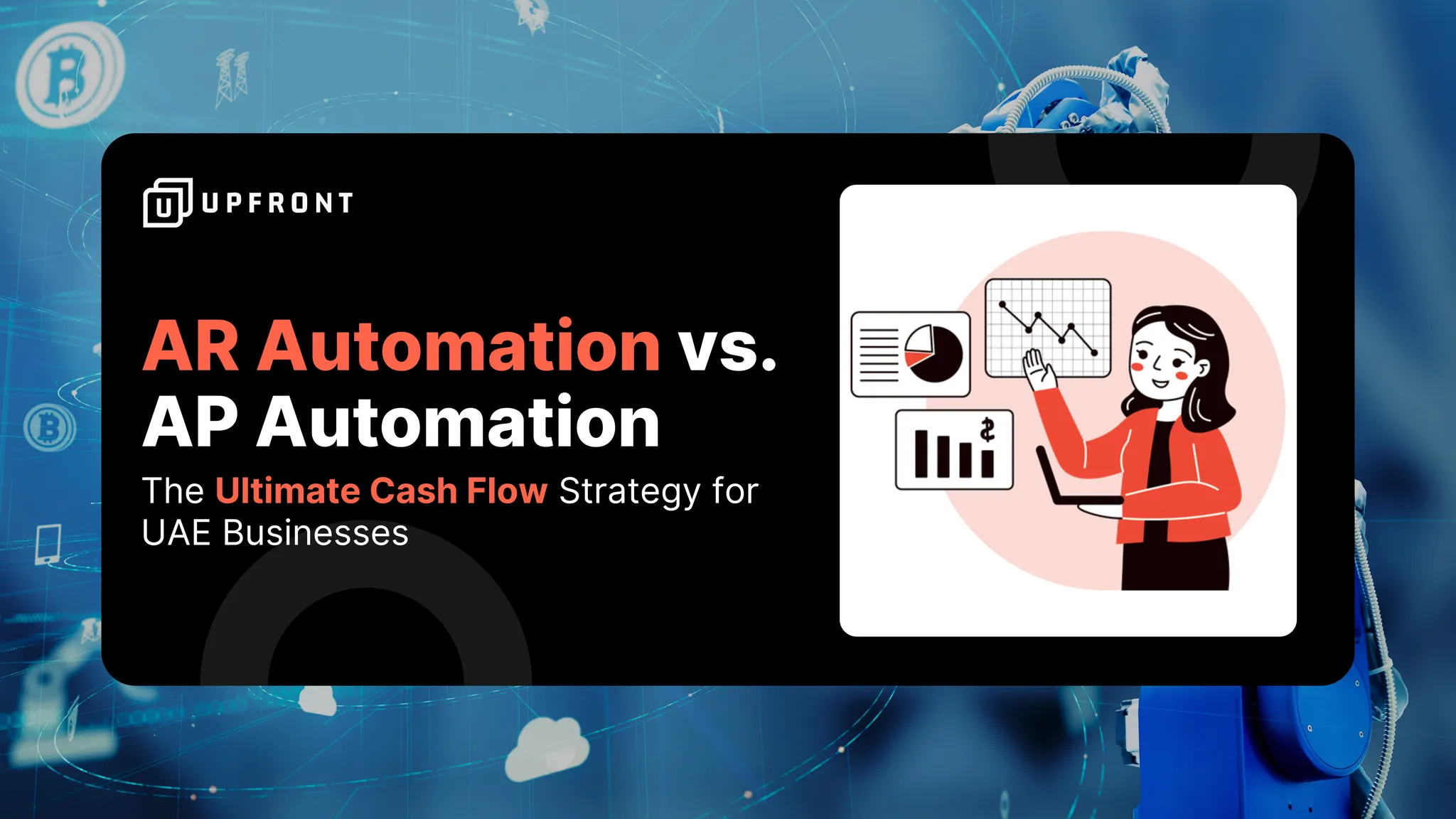Digital payments are making life easier in the UAE and GCC—no doubt about it
But with that convenience comes a bigger worry: security. This is especially true when it comes to secure B2B payment processing in the UAE, where larger amounts of money and sensitive company data are exchanged. One security misstep could cost you a fortune, damage your reputation, and drive clients away.
That’s why choosing secure B2B payment solutions in the UAE isn’t a luxury—it’s business-critical. Whether you’re new to online payment processing in the UAE or looking to upgrade your current setup, here’s a breakdown of the best practices, the role of PCI DSS-compliant B2B payment gateways, and how platforms like UPFRONT can help your business stay protected.
Why Secure B2B Payment Solutions in the UAE Need Extra TLC
Paying another business isn’t like buying a coffee online. Secure B2B transactions in the UAE involve complexities that demand tighter controls:
-
High-Value Transactions: B2B payments often involve large sums, making them prime targets for cybercriminals.
-
Complex Workflows: Invoices, purchase orders, multiple approvers—all introduce potential points of failure.
-
Sensitive Financial Data: From business bank accounts to confidential contract terms, protecting this data is non-negotiable.
-
Variety of Payment Methods: From bank transfers to corporate cards, each method comes with its own security risks.
-
Internal Fraud Risks: Without internal controls, you risk opening the door to insider threats.
Choose the Right B2B Payment Gateway for UAE Businesses
This is your security foundation. Not every gateway supports secure B2B online payment processing in the UAE, so do your homework.
Look for:
-
PCI DSS Level 1 Compliance
-
Tokenization & End-to-End Encryption
-
Built-In Fraud Prevention Tools (AVS, CVV, 3D Secure)
-
Multi-Factor Authentication (MFA)
A secure, integrated B2B payment gateway for UAE enterprises shifts the burden of security off your plate and helps you meet compliance standards.
Tighten Up Your Internal Payment Workflows
Even the best technology won’t protect you if your internal processes are loose. When implementing secure electronic payment methods for B2B transactions, your people and policies matter.
Internal Security Steps:
-
Separate Duties between payment initiators, approvers, and auditors
-
Role-Based Access to systems
-
Approval Chains for large transactions
-
Regular Reconciliation of statements
-
Ongoing Staff Training on phishing, BEC scams, and fake invoices
These controls are vital for preventing both external attacks and internal misuse.
Secure Your Own Systems
If you accept online B2B payments in the UAE, your own digital environment must be airtight.
Focus Areas:
-
Use HTTPS Across All Pages
-
Apply Software Security Updates Promptly
-
Conduct Regular Vulnerability Scans
-
Never Store Sensitive Card Info Directly—leave that to tokenized payment systems
These steps form your first line of defense when handling secure B2B payment processing for SMEs in the UAE.
Know Who You’re Paying
One of the fastest-growing threats in B2B payments is Business Email Compromise (BEC). Protect your funds with proper partner vetting and transaction monitoring.
What to Do:
-
Implement Know Your Business (KYB) Checks
-
Flag Unusual Payment Patterns
-
Verify All Bank Detail Changes Using Alternate Channels
Avoid paying a fraudster by mistake—simple verification steps can save millions.
Secure B2B Payments Checklist for UAE Businesses
| Security Layer | What to Focus On | Responsibility |
|---|---|---|
| Payment Gateway | PCI DSS, Tokenization, Encryption, Fraud Tools | Gateway Provider |
| Internal Controls | Access restrictions, approval steps, audits | Finance/Operations Teams |
| Website & IT Systems | HTTPS, patches, vulnerability scans | IT/Web Teams |
| Transaction Monitoring | KYB, change verification, pattern alerts | Finance/Procurement |
| Staff Awareness | MFA, training, phishing detection | HR/Leadership |
How Secure Platforms Like Upfront.ae Help with Secure B2B Payment Integration
Platforms like UPFRONT provide secure payment processing for B2B companies in the UAE by:
-
Integrating with PCI DSS-compliant payment gateways
-
Enabling real-time tracking of B2B invoices and payments
-
Providing tokenized, embedded payment options
-
Maintaining audit trails for visibility and compliance
Want faster B2B payments in the UAE without sacrificing security? Platforms like UPFRONT let you automate and protect every step of the payment journey.
FAQs: Secure B2B Payment Processing in the UAE
Q1: What are the must-have security features for B2B payment processing in the UAE?
-
PCI DSS-compliant gateway
-
Tokenization & encryption
-
AVS, CVV, and 3D Secure tools
-
Internal controls like split approvals
-
HTTPS-enabled systems
-
Regular staff training
Q2: Why is PCI DSS compliance critical for B2B payments?
PCI DSS ensures that your payment systems meet international standards for handling card data securely. It reduces data breach risks and protects your customers and your business reputation.
Q3: How can I prevent B2B payment fraud like BEC in the UAE?
-
Always verify supplier bank detail changes via a second channel.
-
Train staff to recognize phishing tactics.
-
Use MFA on sensitive email accounts.
-
Create strict internal approval protocols.
Don’t let payment security fears slow your business down.
Stay protected and streamline your operations with secure B2B payment processing solutions built for UAE businesses.
Explore how UPFRONT can help






